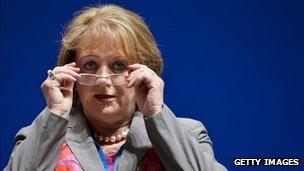GCHQ data-tapping claims nightmarish, says German justice minister
- Published

Allegations that the UK is gathering vast amounts of global communications data by tapping fibre-optic cables sound like a "Hollywood nightmare", Germany's justice minister has said.
"If these accusations are correct, this would be a catastrophe," Sabine Leutheusser-Schnarrenberger said.
Reports suggest GCHQ, the eavesdropping agency, is processing innocent people's sensitive personal information.
But GCHQ has said its compliance with the law was "scrupulous".
Reuters news agency, which reported Ms Leutheusser-Schnarrenberger's comments, also quoted leading German opposition MP Thomas Oppermann as saying: "The accusations make it sound as if George Orwell's surveillance society has become reality in Great Britain.
"This is unbearable... the government must clarify these accusations and act against a total surveillance of German citizens."
The claims surfaced in the Guardian newspaper, which said it had seen leaked documents from GCHQ indicating that information from internet and phone use was being stored for up to 30 days while it was sifted and analysed.
'Strict legal framework'
The documents were reportedly released by Edward Snowden, the former IT contractor at GCHQ's US counterpart, the National Security Agency, who is believed to be in hiding in Hong Kong.
Mr Snowden is behind a string of other disclosures about US intelligence operations. It is reported that US authorities have charged him with espionage and theft.
According to the Guardian, the GCHQ operation codenamed Tempora has been running for 18 months.
The paper said GCHQ was able to boast a larger collection of data than the US, tapping in to 200 fibre-optic cables to give it the ability to monitor up to 600 million communications every day.
BBC security correspondent Gordon Corera says the Guardian is not accusing GCHQ of breaking the law but it does suggest the existing legislation is being very broadly applied to allow such a large volume of data to be collected.
In response to the Guardian report, a GCHQ spokeswoman has said: "We do not comment on intelligence matters. It is worth pointing out that GCHQ takes its obligations under the law very seriously.
"Our work is carried out in accordance with a strict legal and policy framework which ensures that our activities are authorised, necessary and proportionate, and that there is rigorous oversight, including from the Secretary of State, the Interception and Intelligence Services Commissioners and the Intelligence and Security Committee."
- Published22 June 2013
- Published22 June 2013
- Published20 June 2013
- Published17 June 2013
- Published12 June 2013
- Published10 June 2013